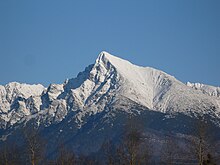
Dr Robert Townson MD FRSE LLD (1762–1827) was an English natural historian and traveller, known also a mineralogist and medical man. In 1806 he emigrated to New South Wales.
Early life
He was born at Richmond, Surrey, the youngest (and illegitimate) child of John Townson (1721–1773) and Sarah Aldcroft née Shewell (1731–1805). His father was a London merchant, his mother was from the Shewell business family, and she was married at the time of his birth to Charles Aldcroft, a haberdasher. His parents married in 1766, and John Townson died in 1774. From 1777 the Townson family were in Shropshire.
Townson, however, was an apprentice in Manchester from about the time the family moved. He didn't wish to enter commerce, and led an itinerant life that started around 1783.
European travels
In 1787 Townson was studying under the chemist Balthasar Georges Sage at the École des Mines. In 1788 he became a student at the University of Edinburgh. He was elected a Fellow of the Royal Society of Edinburgh in 1791, proposed by James Hutton, Alexander Monro (secundus) and William Wright.
In 1793 Townson made a journey through parts of the Kingdom of Hungary. That year he made the first recorded ascents of Kriváň, a peak in the High Tatras now in Slovakia, of Lomnický štít and of Jahňací štít. In 1795 he graduated M.D. at Göttingen University.

Townson was living in Shropshire, at Lydley Hayes near Cardington, when in 1800 Arthur Aikin was seeking him out for assistance on mineralogy. The General View of Agriculture survey for the county edited by Joseph Plymley (also Corbett, surname changed in 1804) in 1803 contained material published by Townson. His sister Ann had married John Witts (1750–1816), who became vicar of Cardington in 1774.
Australia
Townson aimed to use his knowledge of mineralogy in India, but failed to find work there. At the home of Sir Joseph Banks he met William Paterson, of the New South Wales Corps. His brother John of the Royal Marines was in Australia, returning to England in 1800 for a visit. Townson went there, setting off from England at the end of 1806. He became one of the opponents of William Bligh in the Rum Rebellion, and received a land grant.
Subsequently, Townson showed dissatisfaction with his Australian venture. Firstly all the land grants made after the Rum Rebellion were cancelled. Lachlan Macquarie who replaced Bligh visited Townson at home at Kogarah Bay, and replacement grants of land were made, with Townson and his brother having a land grant at Varroville, New South Wales; but Townson did nothing to accept the land until Macquarie left office. He thought the land unsuitable, made plans to return to the United Kingdom that fell through, and became reclusive.
Townson succeeded in his farming and wine growing. In 1822 he was elected to the Agricultural Society of New South Wales He died on 27 June 1827, and was buried in Parramatta.
Works
Townson published:
- Observationes physiologicæ de Amphibiis, Göttingen, 1794
- Travels in Hungary London, 1797. The book contains an account of Townson's exploration of the Tatra Mountains, in which he was accompanied by Thomas Mauksch. It was published with a map supplement, by Johann Matthias Korabinsky (János Mátyás Korabinszky).
- The Philosophy of Mineralogy, London, 1798
- Tracts and Observations in Natural History and Physiology, London, 1799. This work includes the discovery, claimed as original to Townsend, of how tortoises breathe, in the absence of a thoracic diaphragm.
He contributed a paper "Perceptivity of Plants" to the Transactions of the Linnean Society (ii. 267).
Notes
- ^ Torrens, H. S. "Townson, Robert". Oxford Dictionary of National Biography (online ed.). Oxford University Press. doi:10.1093/ref:odnb/27639. (Subscription or UK public library membership required.)
- Biographical Index of Former Fellows of the Royal Society of Edinburgh 1783–2002 (PDF). The Royal Society of Edinburgh. July 2006. ISBN 0-902-198-84-X.
- Renáta Nározná; Colin Saunders (27 July 2012). The High Tatras: Slovakia and Poland - Including the Western Tatras and White Tatras. Cicerone Press Limited. p. 67. ISBN 978-1-84965-486-9.
- ^ Lee, Sidney, ed. (1899). "Townson, Robert (fl.1792-1799)" . Dictionary of National Biography. Vol. 57. London: Smith, Elder & Co.
- H. S. Torrens, Arthur Aikin's Mineralogical Survey of Shropshire 1796–1816 and the Contemporary Audience for Geological Publications, The British Journal for the History of Science Vol. 16, No. 2 (Jul., 1983), pp. 111–153, at p. 116 and p. 146. Published by: Cambridge University Press on behalf of The British Society for the History of Science JSTOR 4026236
- "Townson, Robert (1762–1827)". Biography - Robert Townson - Australian Dictionary of Biography. National Centre of Biography, Australian National University. Retrieved 23 February 2017.
- Joan Lawrence (1996). St George Pictorial Memories: Rockdale, Kogarah, Hurstville. Kingsclear Books Pty Ltd. pp. 8–9. ISBN 978-0-908272-45-7.
- Kay Anderson, White Natures: Sydney's Royal Agricultural Show in Post-Humanist Perspective, Transactions of the Institute of British Geographers Vol. 28, No. 4 (Dec., 2003), pp. 422–441 at p. 429. Published by: Wiley on behalf of The Royal Geographical Society (with the Institute of British Geographers). JSTOR 3804390
- Jerzy W. Gajewski, Robert Townson – The Great Explorer of the Tatra, Alpine Journal 1990–1, at p. 2 of PDF
- Jan Kozák; Alena Čejchanová; Zdeněk Kukal; Karel Pošmourný (24 June 2016). Early Geological Maps of Europe: Central Europe 1750 to 1840. Springer. p. 49. ISBN 978-3-319-22488-6.
- N. S. Rustum Maluf, Robert Townson and the Respiratory Movements of the Tortoise, Isis Vol. 34, No. 2 (Autumn, 1942), pp. 128–132 at p. 129. Published by: The University of Chicago Press on behalf of The History of Science Society JSTOR 226213
External links
- Attribution
![]() This article incorporates text from a publication now in the public domain: Lee, Sidney, ed. (1899). "Townson, Robert (fl.1792-1799)". Dictionary of National Biography. Vol. 57. London: Smith, Elder & Co.
This article incorporates text from a publication now in the public domain: Lee, Sidney, ed. (1899). "Townson, Robert (fl.1792-1799)". Dictionary of National Biography. Vol. 57. London: Smith, Elder & Co.